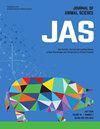23 Physiological and health implications of trace mineral nutrition
IF 2.7
2区 农林科学
Q1 AGRICULTURE, DAIRY & ANIMAL SCIENCE
引用次数: 0
Abstract
Trace minerals are often recommended to avoid possible implications for beef cattle productivity. Trace minerals have several roles in livestock species, such as protein synthesis, enzyme activation, and immune functions. The primary trace minerals for cattle include zinc, copper, selenium, iron, manganese, cobalt, and iodine. These minerals serve as cofactors for numerous enzymes involved in metabolic pathways crucial for growth, reproduction, and immune function. Trace minerals such as zinc, copper, and manganese serve as cofactors for enzymes involved in metabolism. They have crucial roles in carbohydrates, protein, and lipid metabolism, facilitating energy production and nutrient utilization. Additionally, zinc, selenium and copper, are essential for maintaining a robust immune system. They are involved in the production and function of immune cells, antibody response, and the regulation of inflammation, thus aiding in the body’s defense against pathogens and diseases. Selenium, copper, and manganese act as cofactors for antioxidant enzymes that help neutralize harmful free radicals in the body. By scavenging free radicals, these trace minerals protect cells from oxidative damage and reduce the risk of chronic diseases such as cancer, cardiovascular diseases, and aging-related disorders. Cattle obtain trace minerals from various sources, including forages, grains, supplements, and water. However, the bioavailability of these minerals can be influenced by factors such as soil composition, forage type, and dietary interactions. Therefore, careful attention to mineral supplementation and management practices is necessary to meet the specific requirements of cattle at different stages of life and production. Furthermore, research continues to elucidate the complex interactions among trace minerals and their effects on cattle health and performance. Strategies such as targeted supplementation, mineral source selection, and dietary manipulation are being explored to optimize trace mineral nutrition in cattle production systems while minimizing environmental impact and economic costs. However, trace mineral sources might vary in water solubility and bioavailability, affecting their reactivity with antagonists and microorganisms in the rumen. Hence, understanding the importance of these micronutrients and implementing appropriate management practices can help ensure optimal performance and well-being of cattle herds, ultimately contributing to the efficiency and profitability of livestock operations.23 微量元素营养对生理和健康的影响
为避免对肉牛生产率造成可能的影响,通常建议使用微量矿物质。微量矿物质在牲畜体内有多种作用,如蛋白质合成、酶活化和免疫功能。牛的主要微量矿物质包括锌、铜、硒、铁、锰、钴和碘。这些矿物质是许多酶的辅助因子,这些酶参与了对生长、繁殖和免疫功能至关重要的代谢途径。锌、铜和锰等微量矿物质是参与新陈代谢的酶的辅助因子。它们在碳水化合物、蛋白质和脂质的新陈代谢中起着至关重要的作用,有助于能量的产生和营养物质的利用。此外,锌、硒和铜对维持强大的免疫系统也至关重要。它们参与免疫细胞的生成和功能、抗体反应和炎症调节,从而帮助人体抵御病原体和疾病。硒、铜和锰是抗氧化酶的辅助因子,有助于中和体内有害的自由基。通过清除自由基,这些微量元素可保护细胞免受氧化损伤,降低患癌症、心血管疾病和衰老相关疾病等慢性疾病的风险。牛从各种来源获得微量元素,包括草料、谷物、补充剂和水。然而,这些矿物质的生物利用率会受到土壤成分、饲料类型和日粮相互作用等因素的影响。因此,有必要仔细关注矿物质的补充和管理方法,以满足牛在不同生活和生产阶段的特定需求。此外,研究还在继续阐明微量矿物质之间复杂的相互作用及其对牛健康和生产性能的影响。目前正在探索有针对性的补充、矿物质来源选择和日粮控制等策略,以优化牛生产系统中的微量矿物质营养,同时最大限度地减少对环境的影响和经济成本。然而,微量矿物质源的水溶性和生物利用率可能会有所不同,从而影响它们与瘤胃中的拮抗剂和微生物的反应。因此,了解这些微量营养元素的重要性并实施适当的管理措施有助于确保牛群的最佳表现和健康,最终提高畜牧业的效率和盈利能力。
本文章由计算机程序翻译,如有差异,请以英文原文为准。
求助全文
约1分钟内获得全文
求助全文
来源期刊

Journal of animal science
农林科学-奶制品与动物科学
CiteScore
4.80
自引率
12.10%
发文量
1589
审稿时长
3 months
期刊介绍:
The Journal of Animal Science (JAS) is the premier journal for animal science and serves as the leading source of new knowledge and perspective in this area. JAS publishes more than 500 fully reviewed research articles, invited reviews, technical notes, and letters to the editor each year.
Articles published in JAS encompass a broad range of research topics in animal production and fundamental aspects of genetics, nutrition, physiology, and preparation and utilization of animal products. Articles typically report research with beef cattle, companion animals, goats, horses, pigs, and sheep; however, studies involving other farm animals, aquatic and wildlife species, and laboratory animal species that address fundamental questions related to livestock and companion animal biology will be considered for publication.
 求助内容:
求助内容: 应助结果提醒方式:
应助结果提醒方式:


